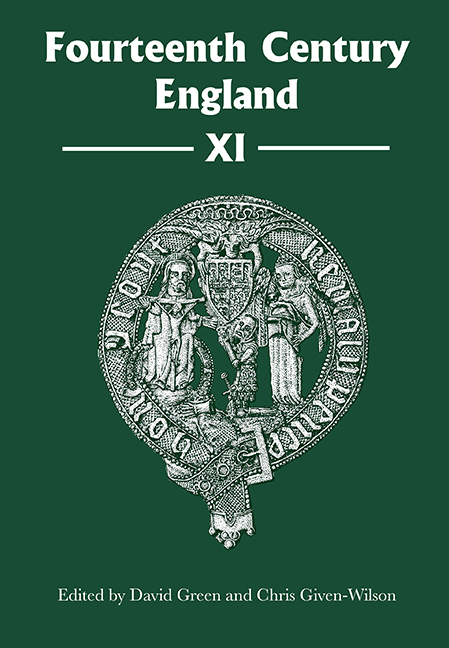Book contents
- Frontmatter
- Contents
- List of Illustrations
- List of Contributors
- Preface
- Abbreviations
- The Evolution of Edward I's ‘Historical’ Claim to Overlordship of Scotland, 1291–1301
- Prelates and Political Reform: The Bishops and the Ordinances of 1311
- Sir Robert de Wateville (d. 1330) of Essex and the Younger Despenser, 1322–6
- Memory, Genealogy and Nationality in Plantagenet England: The Plugenet and Walerand Estates, 1265–1368
- The ‘Apparitional’ Magna Carta in the Long Fourteenth Century
- Family, Loyalty and the Royal Household in Fourteenth-Century England
- The Revolution Stops Here? Leicestershire and the Rebellion of 1381
- FOURTEENTH CENTURY ENGLAND ISSN 1471–3020
Preface
Published online by Cambridge University Press: 14 September 2019
- Frontmatter
- Contents
- List of Illustrations
- List of Contributors
- Preface
- Abbreviations
- The Evolution of Edward I's ‘Historical’ Claim to Overlordship of Scotland, 1291–1301
- Prelates and Political Reform: The Bishops and the Ordinances of 1311
- Sir Robert de Wateville (d. 1330) of Essex and the Younger Despenser, 1322–6
- Memory, Genealogy and Nationality in Plantagenet England: The Plugenet and Walerand Estates, 1265–1368
- The ‘Apparitional’ Magna Carta in the Long Fourteenth Century
- Family, Loyalty and the Royal Household in Fourteenth-Century England
- The Revolution Stops Here? Leicestershire and the Rebellion of 1381
- FOURTEENTH CENTURY ENGLAND ISSN 1471–3020
Summary
The essays in this volume of Fourteenth Century England engage with many of the themes and subjects which make the period so attractive to scholars and the wider public alike. The authors reflect on issues of kingship and changing theories of power at a number of levels; they tackle questions concerning loyalty and rebellion; examine the role of law, both domestic and international; give consideration to the nature of memory – legal, historical and fabricated; and they address the relationship between the Plantagenets and the rulers of those nations and territories over which England claimed dominion.
In so doing, the essays draw on a vibrant array of new scholarship, some of which was published in earlier volumes of FCE, that is transforming our understanding of and approach to the later Middle Ages. They also take advantage of sources which are now much easier to access and which can be interrogated in new ways. The digital revolution has shaped the direction of a good deal of recent research both in terms of international collaborations and what individual scholars may study and how they conduct their studies. The establishment of major databases and digitized source collections has been a key feature of this process. In addition to opening new avenues of enquiry such resources have also prompted a return to more familiar subjects by allowing investigations to be carried out in wholly new ways. Prosopographical work using such materials and employing data analysis software in order to explore the relationships between members of various groups is only one example of this.
As with earlier volumes in this series, several contributions to this collection originated in papers sponsored by the Society for Fourteenth Century Studies at the International Medieval Congress (University of Leeds) and the Society of the White Hart at the International Conference on Medieval Studies (University of Western Michigan). Over many years, these meetings have helped shape broader scholarly agendas as well as individual research projects while maintaining a tradition of friendly collegiality. They have ensured that the fourteenth century, a period of intense and often brutal change, is a very welcoming one to study.
- Type
- Chapter
- Information
- Fourteenth Century England XI , pp. xi - xiiPublisher: Boydell & BrewerPrint publication year: 2019

